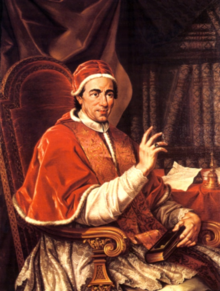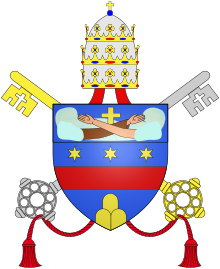Clement XIV.
. Clement XIV (born Lorenzo Ganganelli , actually Giovanni (Gian) Vincenzo Antonio Ganganelli * 31 October 1705 in Santarcangelo di Romagna in Rimini ( Papal State ); † 22. September 1774 in Rome ) was from 1769 to 1774 Pope .
Origin and education
Ganganelli was born on October 31, 1705 as the son of the community doctor in Sant'Arcangelo near Rimini and baptized on November 2. The training in Verucchio and from 1717 in Rimini was made possible by the support of a relative and the Milanese Count Barnaldi. Impressed by the Franciscan life, he joined the Minorites in Mondaino on May 15, 1723 and chose the religious name Lorenzo in memory of his father. After the novitiate in Urbino , he took the religious vows on May 18, 1724. Between 1724 and 1728 he lived in various religious houses in Pesaro , Recanati and Fano , where he mainly studied theology. He then continued his studies (from 1728 to 1731) at the Roman College of S. Bonaventura under the direction of Antonio Lucci , later Bishop of Bovino . He then taught philosophy and theology in Ascoli Piceno , Bologna and Milan for ten years . Few writings from this period attest to his good relations with the Jesuits , such as the Diatriba theologica historico-critico-dogmatica, dedicated to Ignatius of Loyola . In 1740 he returned to the College of S. Bonaventura as Regens and lived in the monastery of SS. Apostoli.
Church career
He owed his appointment as Consultor of the Holy Office (today's Congregation for the Doctrine of the Faith) to his good contacts with some members of the Curia , especially Cardinal Andrea Negroni , a close collaborator of Benedict XIV . During his activity in the Index Congregation, numerous works by the French enlightenment were banned.
Ganganelli was considered a capable, intelligent, and prudent advisor to the Inquisition . On September 24, 1759 he was promoted to cardinal and soon received the titular church of San Lorenzo in Panisperna , which he exchanged for Santi XII Apostoli in 1762 .
pontificate
The three-month conclave after the death of Clemens XIII. Was overshadowed by the Jesuit question and the pressure exerted on the College of Cardinals by the Bourbon states of Portugal, Spain and France. Two parties faced each other: cardinals, who were close to the Bourbon crowns and were opponents of the Jesuits, and the group of Zelanti , friends of the order. After the 185th ballot, the cardinals agreed on Ganganelli, who was elected Pope on May 19, 1769 and who took the name Clemens in memory of his predecessor. He was ordained bishop on May 28, 1769, and ascended the papal throne on June 4.
As a member of the Franciscan religious order and of civil origin, he interrupted the long line of popes who came from respected Italian noble families. He also embarked on a new political course, trying to rely more on employees he trusted directly. On the Jesuit question, the new Pope wanted to buy time above all, since he had left both parties in the dark about his position in the conclave. In his endeavors to achieve a reconciliation with the Bourbon states, he first decided to repeal the ban bull In coena Domini , which was no longer read publicly from Maundy Thursday 1770. With this concession to the Bourbon demand, he succeeded in reopening the papal nunciature in Portugal. But the French, Spanish and Neapolitan kings continued to insist on the abolition of the Jesuit order. On the one hand, they promised the return of Avignon and Benevento , which was occupied by France and Naples, but on the other, threatened to break away from Rome. Under this pressure, the Pope closed the Collegium Romanum , the Roman seminary, and the religious houses in the Papal States on October 17, 1772 , and in February allowed the Archbishop of Bologna to make an apostolic visit to the Jesuits. On July 21, 1773 ordered Clemens finally with the brief (and not in a Papal Bull , but "by letter" by a subordinate legal status) Dominus ac noster redemptor the Suppression of the Society of Jesus . The Breve begins with a reference by the Pope to his efforts for peaceful coexistence, followed by a list of allegations made against the Order by Sixtus V to Benedict XIV. Spain, Portugal and Sicily gave in and deprived the order of all functions and administration.
Clemens XIV., During whose term of office around 4,000 boys were castrated annually , allowed women to sing the soprano parts in the churches and to appear again on the stages of the Vatican states.
In the last months of his pontificate, Clemens believed that the superiors of the Jesuit order wanted to poison him from their cells in the Castel Sant'Angelo . This is mostly seen by today's historians as unfounded. In contrast, other voices often take the position that Clemens wanted to tighten the Jesuit ban with a bull and was killed the night before it was signed.
death
From March 1774, his health deteriorated rapidly. He died on September 22nd, 1774. First he was buried in St. Peter's Basilica, but in 1802 he was transferred to his cardinal titular church " Santi XII Apostoli ".
After the Pope died, his personal physician, Pasquale Adinolfi , examined the corpse of Ganganelli for traces of poison with the physician Natale Saliceti (1714–1789) and an international medical association. As a published result, no evidence of any external influence was found.
literature
- Mario Rosa : Clemente XIV. In: Massimo Bray (ed.): Enciclopedia dei Papi. Volume 3: Innocenzo VIII, Giovanni Paolo II. Istituto della Enciclopedia Italiana, Rome 2000 ( treccani.it ).
- Friedrich Wilhelm Bautz : Clemens XIV .. In: Biographisch-Bibliographisches Kirchenlexikon (BBKL). Volume 1, Bautz, Hamm 1975. 2nd, unchanged edition Hamm 1990, ISBN 3-88309-013-1 , Sp. 1062-1063.
- Natale Saliceti: Expert opinion of D. Saliceti, Medici of the Apostolic Palace and doctor of Fr Clement XIV. Of the cause of the death of the same September 22, 1774 . In: Magazine on the use of states and church history as well as the spiritual constitutional law of Catholic princes with regard to their clergy, Fünfter Theil, Frankfurt and Leipzig 1776, pp. 304–323, books.google.de
- Alfred Meißner : From the story of the fathers of Jesus . In: The Gazebo . Issue 1, 1867, pp. 8–11 ( full text [ Wikisource ]).
Web links
- Literature by and about Clemens XIV. In the catalog of the German National Library
- Works by and about Clemens XIV. In the German Digital Library
- Entry in the Catholic Encyclopedia , Robert Appleton Company, New York 1913.
Individual evidence
- ^ Oskar Panizza : German theses against the Pope and his dark men. With a foreword by MG Conrad . New edition (selection from the “666 theses and quotations”). Nordland-Verlag, Berlin 1940, p. 171.
- ^ Patrick Barbier: Historia dos Castrados. (Portuguese version; title of the French original: Histoire des Castrats. ) Lisbon 1991 (originally Editions Grasset & Fasquelle, Paris, 1989), p. 145.
| predecessor | Office | successor |
|---|---|---|
| Clement XIII. |
1769–1774 |
Pius VI |
| personal data | |
|---|---|
| SURNAME | Clement XIV. |
| ALTERNATIVE NAMES | Lorenzo Ganganelli |
| BRIEF DESCRIPTION | Pope |
| DATE OF BIRTH | October 31, 1705 |
| PLACE OF BIRTH | Santarcangelo di Romagna |
| DATE OF DEATH | September 22, 1774 |
| Place of death | Rome |

